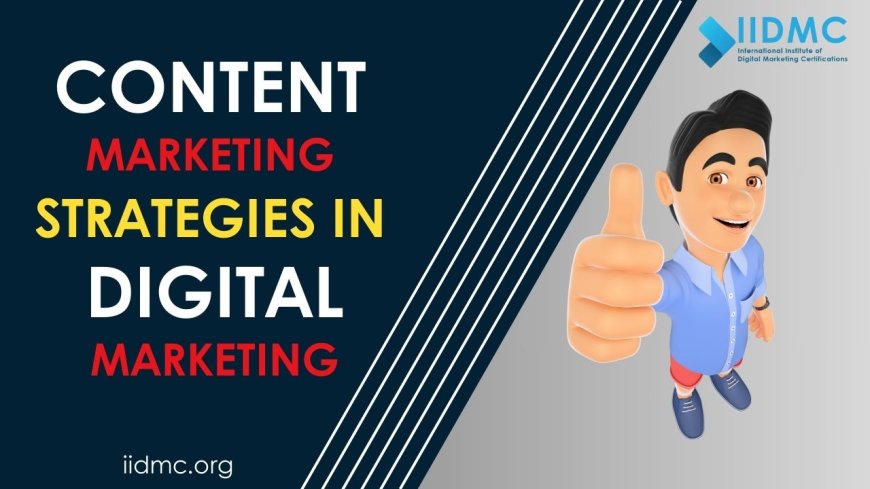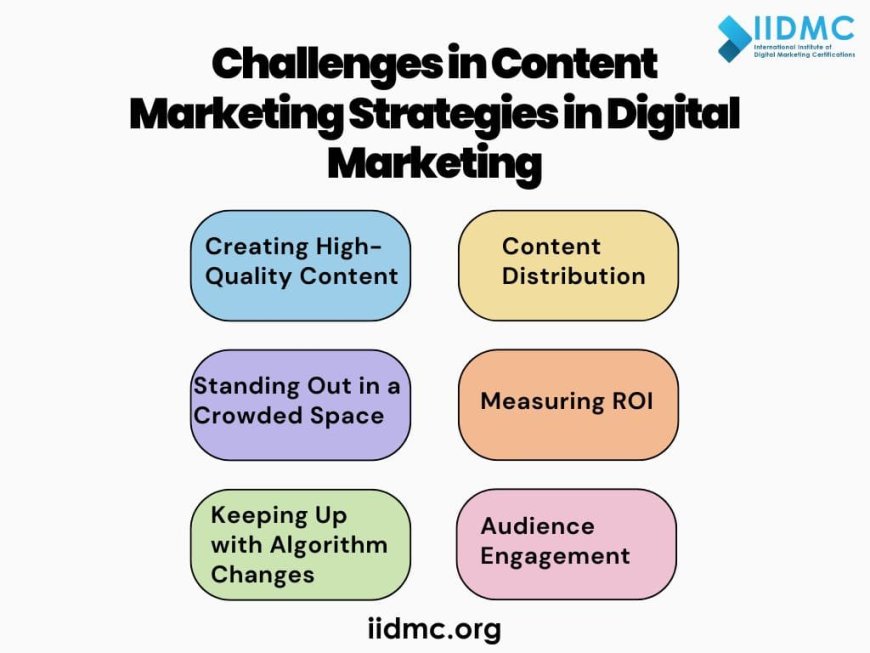Content Marketing Strategies in Digital Marketing
Discover effective content marketing strategies for digital marketing success. Learn how to engage audiences and drive results with strategic content.

Content marketing is like the secret sauce of digital marketing. It's all about creating valuable, interesting stuff—like blog posts, videos, or social media posts—that people want to see. Instead of just trying to sell things, content marketing helps businesses connect with their audience, build trust, and stand out in the busy online world. So, if you want to succeed in digital marketing, mastering content marketing is key
Businesses are starting to realize how crucial it is to incorporate content marketing into their digital strategies in the age of the Internet. Businesses need to figure out how to distinguish and attract customers in the crowded online market. To establish rapport, generate revenue, and accomplish their objectives in a crowded digital market, they must employ material that is both engaging and beneficial to their audience.
What is Content Marketing in Digital Marketing?
Content marketing in digital marketing is the deliberate creation and sharing of valuable content online to connect with and engage a target audience. It's about providing relevant information, solving problems, and building relationships, rather than directly selling products or services. Through various digital channels, businesses aim to attract and retain customers by offering content that resonates with their interests and needs, ultimately driving brand awareness and loyalty.
Key points:
-
Strategic Approach: Content marketing is a strategic approach focused on creating, distributing, and managing valuable and relevant content to attract, engage, and retain a target audience.
-
Value Creation: It emphasizes providing valuable and relevant information, entertainment, or solutions to the audience's needs, interests, and pain points rather than directly promoting products or services.
-
Audience-Centric: Content marketing revolves around understanding the audience's preferences, behaviors, and demographics to tailor content that resonates with their interests and addresses their challenges.
-
Multichannel Presence: Content marketing leverages various digital channels and platforms such as websites, social media, email, blogs, podcasts, videos, and more to reach and engage with the target audience across different touchpoints.
-
Brand Awareness and Authority: By consistently delivering high-quality content, businesses aim to enhance brand visibility, credibility, and authority within their industry or niche.
Why Content Marketing Strategies are Crucial in Digital Marketing?
Content marketing strategies are crucial in digital marketing because they help businesses build trust, establish authority, and foster long-term relationships with their audience. By delivering valuable and relevant content, businesses can differentiate themselves from competitors, drive brand awareness, and ultimately drive conversions and sales.
keypoints:
-
Audience Engagement: Content marketing allows businesses to engage with their target audience by providing valuable and relevant information that resonates with their interests and needs.
-
Brand Visibility: Through consistent content creation and distribution, businesses can increase their online visibility and brand awareness, making it easier for potential customers to discover their products or services.
-
Building Trust and Credibility: By delivering high-quality content that addresses the pain points and challenges of their audience, businesses can establish themselves as trusted authorities in their industry, fostering trust and credibility among their audience.
-
Lead Generation and Nurturing: Content marketing serves as a powerful tool for lead generation and nurturing, guiding prospects through the buyer's journey by providing them with relevant information at each stage, ultimately increasing the likelihood of conversion.
-
Search Engine Optimization (SEO): Valuable and optimized content can improve a website's search engine ranking, driving organic traffic and increasing visibility in search engine results pages (SERPs).
Where Content Marketing Fits into Digital Marketing Frameworks?
Content marketing fits into digital marketing frameworks as a core component that drives engagement, builds brand awareness, and nurtures leads across various online channels. It plays a pivotal role in every stage of the customer journey, from initial awareness to post-purchase advocacy, seamlessly integrating with other digital marketing tactics such as SEO, social media marketing, email marketing, and more.
Key points:
-
Audience Engagement: Content marketing is a cornerstone of digital marketing frameworks, serving as a primary tool for engaging with target audiences across various online channels.
-
Brand Awareness: By creating and distributing valuable content, businesses can increase their brand visibility and recognition among their target audience, driving awareness and familiarity with their products or services.
-
Lead Generation: Content marketing plays a crucial role in generating leads by offering valuable resources, such as eBooks, whitepapers, or webinars, in exchange for contact information, allowing businesses to nurture prospects through the sales funnel.
-
Customer Relationship Management (CRM): Content marketing helps businesses build and nurture relationships with existing customers by providing ongoing value and support through relevant and informative content.
-
Search Engine Optimization (SEO): High-quality and optimized content can improve a website's search engine ranking, driving organic traffic and visibility in search engine results pages (SERPs), thereby enhancing the overall digital marketing strategy.
When to Implement Content Marketing Strategies in Digital Marketing Campaigns?
Implement content marketing strategies in digital marketing campaigns right from the start, ideally during the planning phase. Content helps attract and engage your audience, so having it ready ensures you can captivate potential customers from the get-go. Whether it's creating blog posts, social media content, or videos, integrating content marketing early ensures your campaign is set up for success by establishing a strong connection with your audience from the outset.
keypoints:
-
At the Planning Stage: Content marketing strategies should be integrated into digital marketing campaigns during the planning phase. This ensures that content creation aligns with campaign goals and target audience preferences from the outset.
-
Before Launch: Content should be prepared and scheduled before the campaign launch to ensure a seamless rollout. This allows businesses to build anticipation, generate buzz, and attract attention from their audience right from the start.
-
Throughout the Campaign: Content marketing should be ongoing throughout the digital marketing campaign. Regularly publishing fresh and relevant content helps maintain audience engagement, drive traffic, and reinforce key campaign messages.
-
During Key Campaign Phases: Content should be strategically deployed during key phases of the campaign, such as awareness, consideration, conversion, and retention. Tailoring content to each stage of the customer journey ensures maximum impact and effectiveness.
-
In Response to Audience Feedback: Monitoring audience feedback and engagement metrics allows businesses to adjust and optimize content marketing strategies in real time. This flexibility ensures that content remains relevant and resonates with the audience's evolving needs and preferences.
How Content Marketing Strategies Work in Digital Marketing?
Content marketing strategies in digital marketing work by creating valuable and relevant content to connect with and engage target audiences online. Through channels like websites, social media, and email, businesses share content that addresses audience needs and interests, building trust and credibility. This leads to increased brand awareness, customer loyalty, and ultimately, business growth in the digital realm.
Key points:
-
Audience-Centric Approach: Content marketing strategies revolve around understanding the preferences, behaviors, and needs of the target audience, ensuring that content resonates with their interests and challenges.
-
Value Creation: Content marketing focuses on creating valuable and relevant content that provides information, entertainment, or solutions to the audience's problems, rather than overtly promoting products or services.
-
Multi-Channel Distribution: Content is distributed across various digital channels and platforms such as websites, social media, email, blogs, and more, allowing businesses to reach their audience at different touchpoints throughout their online journey.
-
Engagement and Relationship Building: By consistently delivering high-quality content, businesses can engage with their audience, build trust, credibility, and long-term relationships, fostering loyalty and advocacy.
-
Lead Generation and Nurturing: Content marketing serves as a tool for lead generation by offering valuable resources such as eBooks, webinars, or guides in exchange for contact information. Businesses then nurture leads through personalized content tailored to their interests and needs.
Challenges in Content Marketing Strategies in Digital Marketing

-
Creating High-Quality Content: Maintaining a consistent stream of high-quality content can be challenging, especially with limited resources and time constraints.
-
Standing Out in a Crowded Space: With the abundance of content available online, breaking through the noise and capturing audience attention can be difficult.
-
Keeping Up with Algorithm Changes: Changes to search engine algorithms and social media algorithms can impact content visibility and reach, requiring continuous adaptation of content strategies.
-
Content Distribution: Ensuring content reaches the right audience through effective distribution channels can be challenging, particularly with changing platform algorithms and audience behavior.
-
Measuring ROI: Determining the effectiveness of content marketing efforts and attributing ROI can be challenging, as it often involves tracking multiple metrics across different channels.
-
Audience Engagement: Engaging and retaining audience interest over time requires ongoing creativity and innovation to avoid content fatigue.
content marketing strategies are essential components of digital marketing, driving audience engagement, brand awareness, lead generation, and customer loyalty. Despite facing challenges such as creating high-quality content, standing out in a crowded digital landscape, and adapting to algorithm changes, businesses can overcome these obstacles by prioritizing audience needs, staying agile, and continuously optimizing their content strategies. By leveraging the power of valuable and relevant content, businesses can effectively connect with their target audience, establish trust and credibility, and ultimately drive growth and success in the digital realm.



























